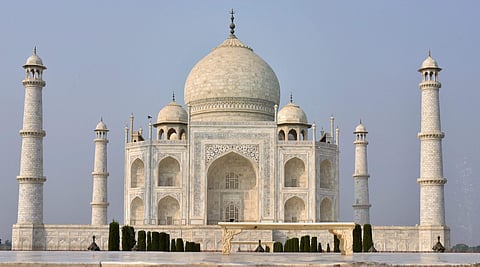

NEW DELHI: The Supreme Court today slammed the Uttar Pradesh government for filing a draft report of the vision document on protection and preservation of the Taj Mahal and asked whether the apex court was supposed to vet it.
A bench comprising justices M B Lokur and Deepak Gupta came down heavily on the Uttar Pradesh government and questioned the state's concern in the matter.
"Why have you given a draft plan? Are we supposed to vet it for you? Is it our job to vet it," the bench asked the counsel appearing for the Uttar Pradesh government.
The apex court said it was "surprising" that the Archeological Survey of India (ASI), responsible for protection of the 17th century monument, was not consulted in framing the draft report.
During the hearing, the bench asked Attorney General K K Venugopal whether the Centre or the authorities concerned had submitted the management plan on Taj Mahal to UNESCO's World Heritage Centre in Paris.
"What will happen if UNESCO says that we will withdraw the World Heritage tag of the Taj Mahal," the bench asked Venugopal.
Responding to the query, the attorney general said the Taj Mahal was one of the seven wonders of the world and it would be a "great, great embarrassment" for the country if the World Heritage tag of the historic monument was withdrawn.
The apex court also asked the AG which department of the Centre and the state government was responsible for maintenance of the Taj Trapezium Zone (TTZ).
TTZ is an area of about 10,400 sq km spread over the districts of Agra, Firozabad, Mathura, Hathras and Etah in Uttar Pradesh and Bharatpur district of Rajasthan.
The top court also asked the state government to supply the draft report to a panel of conservation experts, including INTACH (Indian National Trust for Art and Cultural Heritage), for their comments.
The bench has listed the matter for further progress on the draft report of the vision document on August 28.
In the draft vision document filed on July 24, the Uttar Pradesh government said that the entire precinct of Taj Mahal should be declared a no-plastic zone and use of bottled water be also prohibited there.
The state government also said that all polluting and sick industries from the area be removed and focus should be on having a comprehensive traffic management system in which pedestrian movement should be encouraged.
The draft report, running into more than 220 pages, said a balanced approach towards environment and development should be adopted at Taj Mahal precinct level and the comprehensive traffic management plan should encourage the visitors to travel on foot or use eco-friendly modes of transport.
It said road widening schemes in the heritage precincts to accommodate the increasing traffic need to be prohibited and battery operated eco-friendly modes of transport along tourist routes was required to be introduced with designated stops for 'hop on hop off'.
According to the state, to deal with the issue of pollution in the area, afforestation should be promoted in the TTZ region by increasing the green areas and polluting and private vehicles should be restricted in the region.
The state said no construction or built forms should be proposed on the flood plains and Yamuna river banks should only have natural plantations.
It has suggested about "closure of polluting industries in the region and promotion with incentives in alterative industries as per availability of raw materials" and "removal of sick industries and allocating lands to more economical non-polluting white and green category of industries" there.
The vision document was submitted after an angry apex court on July 11 had lashed out at Uttar Pradesh government for its apathy towards the historic monument.
The apex court, which has been monitoring development in the area to protect the Taj Mahal built by Mughal emperor Shah Jahan in the memory of his wife Mumtaz Mahal at Agra in 1643, would take up the matter on a day-to-day basis from July 31.
(With inputs from Express News Service)